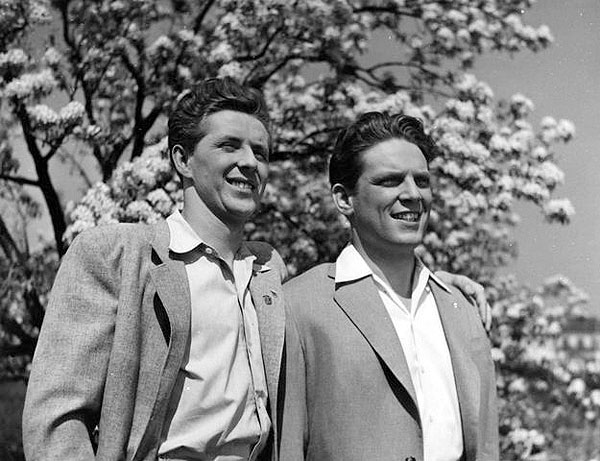Regie:
Vladimír VlčekKamera:
Václav HuňkaMusik:
Ludvík PodéšťBesetzung:
Zdeněk Buchvaldek, Eva Kubešová, Miloš Nesvadba, Marcela Martínková, Jiří Vala, Jiří Adamíra, Pavel Šmok, Ludmila Vendlová, An Son-Chi, Jaroslav Hrkal (mehr)Kritiken (2)
Ein Roadmovie über die Reise in eine neue Kultur, eine neue Folklore, einen neuen Menschen. Für die damalige Zeit ein ziemlich gewagter Versuch, ein sozialrealistisches Musical zu schaffen, das ausschließlich auf folkloristischen Tanz- und Gesangsdarbietungen basiert. Mit dem Film haben die Autoren und der Regisseur, vielleicht ungewollt, eine präzise Landkarte der Mythologie der 1950er Jahre vorgelegt, in die sich alle wichtigen Themen einfügen und die von allen typischen ideologischen Mechanismen geprägt ist. Tatsache ist, dass meine anfängliche Abneigung bezüglich des Film durchs so etwas wie Respekt für sein Zeitporträt ersetzt wurde... Meiner Meinung nach handelt es sich hier nicht um eine von angeheuerten Leibeigenen konstruierte Party, sondern um eine sehr authentische Darstellung des Pathos einer jungen Generation, die in den kommenden Jahren das Ideal der Neuen Welt sah. Heute betrachte ich zum x-ten Mal die Spuren der Vergangenheit in Morgen tanzt die ganze Welt mit Faszination, denn dieser Film sagt viel mehr über das Wesen der kommunistischen Ideologie aus als alle neosowjetischen Verurteilungen der heutigen Zuschauer. Ein Publikum, das sich kaum bewusst ist, dass es selbst Tag für Tag bereitwillig den Mechanismen der Manipulation erliegt, die es in Morgen tanzt die ganze Welt hysterisch anprangert.
()
(I’ve seen it a zillion times, also in the movie theater). Some people smile with happiness at Casablanca, others like to have a drink now and then at the 3rd World Festival of Youth and Students in 1951, which was attended by some 26,000 delegates from a total of 104 countries. Long live the students of Ethnography and their loved ones! Rozárka, I hope you will invite me to the wedding too. :D "We want peace!" "So do we!" After the 12th rerun, I have once again delved so deeply into the secrets of this film in which nothing happens that I feel blissful. Alena loves An Son-Chi and Pavel loves Alena, but the most possibilities are provided by his union with Mirek (he is a reliable boy, he thinks in terms of five-year plans). Lojza wants Rozárka, but she succumbs to the gossip of the villain Rudy, who is jealous of his unfaithful Ota. Ota is worried about Jan and Hanka is acting like a star, which is a bourgeois throw-back. And what did Věra have to say about it? Isn't she the main obstacle to Ota's love for Hanka and Rozárka's love for Lojza? Which is closer to Korea, Moscow or Prague? Were the creators of Crocodile Dundee inspired by this film? Or is finding love in a crowd just a classic metaphor? It's a good thing that the films belong to the people and that future generations won't be deprived of anything because I simply couldn't bear to see such injustice.
()

